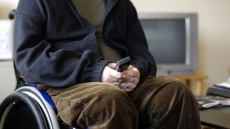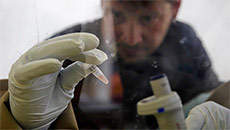A first-of-its-kind wearable medical device can quickly alert a person if they are having heart trouble or if it is time to apply some skin cream.
The five centimetre square small device can be placed directly on the skin and worn round-the-clock on the wrist for monitoring heath.
The wireless technology uses thousands of tiny liquid crystals on a flexible substrate to sense heat.
When the device turns colour, the wearer knows something is awry.
"Our device is mechanically invisible. It is ultra-thin and comfortable, much like skin itself," said Yonggang Huang, one of the senior researchers from the Northwestern University.
The device is an array of up to 3,600 liquid crystals, each half a millimetre square - laid out on a thin, soft and stretchable substrate.
The technology uses the transient temperature change at the skin's surface to determine blood flow rate, which is of direct relevance to cardio-vascular health, and skin hydration levels (when the skin is dehydrated, the thermal conductivity property changes).
When a crystal senses temperature, it changes colour and the dense array provides a snapshot of how the temperature is distributed across the area of the device.
An algorithm translates the temperature data into an accurate health report, all in less than 30 seconds.
"These results provide the first examples of 'epidermal' photonic sensors," added John A. Rogers, a Swanlund chair and professor of materials science and engineering at the University of Illinois.
The device also has a wireless heating system that can be powered by electromagnetic waves present in the air.
The heating system is used to determine the thermal properties of the skin.
The paper appeared in the journal Nature Communications.





